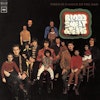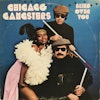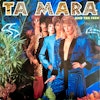Blood, Sweat & Tears’ “Spinning Wheel” has long been cemented in the annals of classic rock history, yet an earlier iteration of the group stands the real test of time. Released in February 1968, BS&T’s debut Child Is Father to the Man is a uniquely late ’60s aural milieu that still sounds fresh today.
A sensitive and seamlessly eclectic record, Child Is Father to the Man managed to be both familiar and far-out. Its twelve tracks meld the soul, folk, and classical influences that pop audiences would’ve been attuned to, adding in blues phrasing and jazzy arrangements specific to the New York scene that the young BS&T hailed from. While the album was summarily considered a pop LP by Columbia Records, hindsight highlights BS&T’s first release as one of the earliest examples of soulful rock. An unintentional concept album, it holds its own alongside contemporaries Sgt. Pepper’s and Pet Sounds, but never tried so hard.
The not-so-secret ingredient to the album’s success (though Child never had any charting singles or broke the Top 40) was multi-instrumentalist Al Kooper, who envisioned BS&T’s sound after his short-lived Greenwich Village five-piece the Blues Project disbanded. By ’67, the twenty-three-year-old Kooper had already penned the #1 single “This Diamond Ring” and his organ prowess was featured on Bob Dylan’s “Like a Rolling Stone.” Despite his background in folk and blues, Kooper was eager to bring a horn section into the rock world (which he’d later do with the Rolling Stones, playing French horn on “You Can’t Always Get What You Want”). To help fund his vision of a horn-laced rock album, which Kooper had originally hoped to record in London, he organized a star-studded benefit at Café Au Go Go featuring Judy Collins, Simon and Garfunkel, and Richie Havens. The show sold out, but the owner of the club allegedly added so many expenses to Kooper’s tab that he didn’t earn enough money at all. Refocusing a little closer to home and using the nucleus of the one-off band that had played the benefit, the eight-piece Blood, Sweat & Tears was born.
Child Is Father to the Man was recorded in two weeks, often using single takes, under the direction of John Simon (who had just produced Simon and Garfunkel’s Bookends). The album opens with an orchestral overture then immediately plows into psychedelic yet primal blues on “I Love You More Than You’ll Ever Know,” before setting up the film score–worthy introduction to Tim Buckley’s “Morning Glory.” The B-side dabbles in the folkloric side of Summer of Love sounds with “Meagan’s Gypsy Eyes” (probably Child’s weakest song) and the exuberant “House in the Country” (“you won’t find a manhole there,” Kooper & Co. effuse). Throughout, BS&T lay bossa nova and jazz over poetic lyricism—mostly bluesy dirges and pleading love songs written by Kooper and sung in his imperfect style.
Under a less studied arranger/bandleader, Child would be spasmodic and uneven. Yet Kooper’s varied influences and arrangements—as well as the utilization of a string ensemble, aka “soul chorus,” which imbued tracks like “The Modern Adventures of Plato, Diogenes and Freud” with a classical sensibility—netted something special. However, the real genius is in Child’s use of horns. Kooper enlisted four players, including arranger/alto saxophonist Fred Lipsius, to add an inventive flourish to BS&T’s psych rock. “Just the fact that the horns were used as an actual part of the music…was not common that year. Horns were used in R&B bands already, but not really pop groups,” says trombonist Dick Halligan. “Soul groups set the stage for Blood, Sweat & Tears. Their horn sections had a similar sound, but our sound was a little bit more sophisticated. If you took the horns out, it would not be so dynamic.”
The BS&T horns add an important, enlivening punch to the album’s standout tracks. They bring a serious cool, an almost Wall of Sound quality, to the lovelorn “My Days Are Numbered” and are the blaring backbone of “Somethin’ Goin’ On,” offering a few Maceo-worthy blows and a killer sax solo among Kooper’s improvised howls—which evoke the likes of Little Richard as well as what punks would be doing a decade later across town in the East Village.
BS&T toured Child at midsize clubs across the country, though Al Kooper soon left the band to focus on production and session gigs. The group brought on David Clayton-Thomas, arguably a better singer, and released a string of hits in a more rock and pop radio-friendly vein. Yet Child Is Father to the Man, with its creepy cover (children sat on the laps of the band in the photo studio, then members’ heads were pasted on top for a truly trippy effect, Halligan remembers) and then-avant-garde fusion sound, is Blood, Sweat & Tears at its most earnest and enduring. With its righteous organ, blues guitar, and searing horns, this Child was ahead of its time—a direct influence on groups like Chicago and eventually sampled by Wu-Tang Clan.


